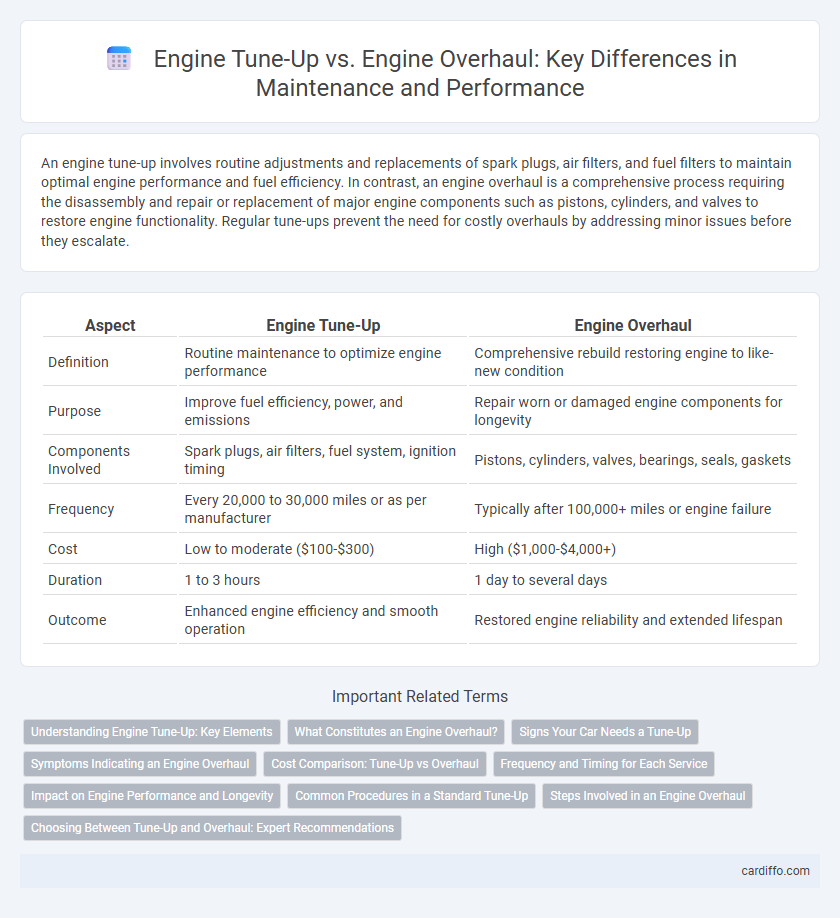An engine tune-up involves routine adjustments and replacements of spark plugs, air filters, and fuel filters to maintain optimal engine performance and fuel efficiency. In contrast, an engine overhaul is a comprehensive process requiring the disassembly and repair or replacement of major engine components such as pistons, cylinders, and valves to restore engine functionality. Regular tune-ups prevent the need for costly overhauls by addressing minor issues before they escalate.
Table of Comparison
| Aspect | Engine Tune-Up | Engine Overhaul |
|---|---|---|
| Definition | Routine maintenance to optimize engine performance | Comprehensive rebuild restoring engine to like-new condition |
| Purpose | Improve fuel efficiency, power, and emissions | Repair worn or damaged engine components for longevity |
| Components Involved | Spark plugs, air filters, fuel system, ignition timing | Pistons, cylinders, valves, bearings, seals, gaskets |
| Frequency | Every 20,000 to 30,000 miles or as per manufacturer | Typically after 100,000+ miles or engine failure |
| Cost | Low to moderate ($100-$300) | High ($1,000-$4,000+) |
| Duration | 1 to 3 hours | 1 day to several days |
| Outcome | Enhanced engine efficiency and smooth operation | Restored engine reliability and extended lifespan |
Understanding Engine Tune-Up: Key Elements
Engine tune-up involves precise adjustments and replacements of components such as spark plugs, filters, and ignition systems to ensure optimal engine performance and fuel efficiency. Regular tune-ups prevent issues like misfires, poor acceleration, and increased emissions by maintaining proper timing and fuel-air mixture. Understanding the key elements of an engine tune-up helps extend engine life and supports smoother vehicle operation.
What Constitutes an Engine Overhaul?
An engine overhaul involves a comprehensive disassembly, inspection, and refurbishment or replacement of major engine components such as pistons, crankshaft, camshaft, valves, and cylinder heads to restore the engine's performance and extend its lifespan. This process addresses wear and damage beyond routine maintenance, often requiring machining and precise reassembly to meet manufacturer specifications. Unlike an engine tune-up, which focuses on adjusting and replacing minor components like spark plugs and filters, an engine overhaul rebuilds the core mechanical structure of the engine.
Signs Your Car Needs a Tune-Up
A car in need of an engine tune-up often exhibits signs such as rough idling, reduced fuel efficiency, and difficulty starting. Engine tune-ups address spark plug replacement, air filter changes, and fuel system cleaning to optimize performance. Neglecting these symptoms may lead to more extensive repairs, including a full engine overhaul.
Symptoms Indicating an Engine Overhaul
Persistent loss of engine power, excessive smoke from the exhaust, and unusual knocking or ticking noises are key symptoms indicating the need for an engine overhaul. Increased oil consumption, frequent overheating, and poor fuel efficiency further signal internal engine wear or damage requiring comprehensive repairs. Early diagnosis of these symptoms can prevent complete engine failure and ensure optimal vehicle performance.
Cost Comparison: Tune-Up vs Overhaul
Engine tune-up costs typically range between $100 and $300, focusing on replacing spark plugs, filters, and performing minor adjustments to improve performance. In contrast, an engine overhaul can cost anywhere from $2,500 to $4,000 or more, involving comprehensive disassembly, cleaning, repair, or replacement of engine components to restore full functionality. Choosing between a tune-up and an overhaul depends on the engine's condition, with tune-ups being a cost-effective option for routine maintenance and overhauls reserved for severe engine wear or damage.
Frequency and Timing for Each Service
Engine tune-ups are recommended every 30,000 to 50,000 miles to maintain optimal performance by adjusting spark plugs, fuel filters, and ignition systems. Engine overhauls are less frequent, typically necessary at 100,000 to 150,000 miles or when significant internal wear, such as piston or cylinder damage, occurs. Timely tune-ups prevent major engine issues and extend the interval before a costly overhaul becomes essential.
Impact on Engine Performance and Longevity
An engine tune-up enhances performance by optimizing fuel efficiency, ignition timing, and airflow, leading to smoother operation and improved power output. Engine overhaul involves dismantling and refurbishing or replacing critical components like pistons, cylinders, and valves, significantly extending engine longevity by restoring worn parts. Regular tune-ups maintain consistent engine performance, while overhauls address deep mechanical wear, ensuring long-term durability and reliability.
Common Procedures in a Standard Tune-Up
Common procedures in a standard engine tune-up include inspecting and replacing spark plugs, checking ignition timing, and cleaning or replacing air and fuel filters. Technicians may also adjust the carburetor or fuel injection system to optimize fuel efficiency and engine performance. These routine maintenance tasks help ensure smooth engine operation and prevent more extensive repairs like an engine overhaul.
Steps Involved in an Engine Overhaul
An engine overhaul involves a comprehensive disassembly of the engine, inspection of all components, and replacement or refurbishment of worn parts such as pistons, bearings, and valves. Precision measurements and machining processes ensure restored clearances and optimal performance, including cylinder honing and crankshaft grinding. Final steps include reassembly with new gaskets and seals, followed by rigorous testing to verify engine reliability and efficiency.
Choosing Between Tune-Up and Overhaul: Expert Recommendations
Expert recommendations emphasize selecting an engine tune-up for routine maintenance to optimize fuel efficiency and performance, while an engine overhaul is advised when significant wear or damage impairs functionality. Diagnostic assessments, including compression tests and oil analysis, guide the decision by revealing the engine's internal condition and potential component failures. Prioritizing timely tune-ups extends engine lifespan, whereas overhauls are cost-effective solutions to restore older engines to factory specifications.
Engine Tune-Up vs Engine Overhaul Infographic

 cardiffo.com
cardiffo.com